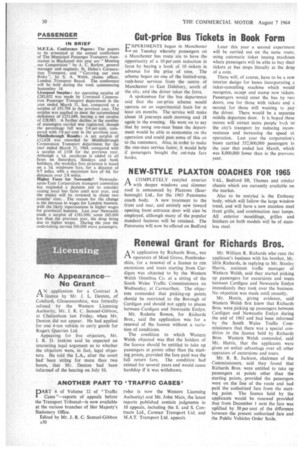Cut-price Bus Tickets in Book Form
Page 32

If you've noticed an error in this article please click here to report it so we can fix it.
EXPERIMENTS began in Manchester on Tuesday whereby passengers on a Manchester bus route are to have the opportunity of a 10 per cent reduction in fares by buying a book of 10 tickets in advance for the price of nine. The scheme began on one of the limited-stop, rush-hour services from the centre of Manchester to East Didsbury, south of the city, and the driver takes the fares.
A spokesman for the bus department said that the cut-price scheme would operate on an experimental basis for at least six months. The service will make about 18 journeys each morning and 18 again in the evening. He went on to say that by using one-man buses the department would be able to economize on the operation and could pass some of this on to the customers. Also, in order to make the one-man service faster, it would help if passengers bought the cut-rate fare books.
Later this year a second experiment will be carried out on the same route, using automatic ticket issuing machines where passengers will be able to buy their tickets at bus stops literally at the drop of a coin.
There will, of course, have to be a new interior design for buses incorporating a ticket-cancelling machine which would recognize, aczept and stamp new tickets. Passengers would enter the bus by two doors, one for those with tickets and a second for those still wanting to pay the driver. There would be a separate middle departure door. It is hoped these moves will attract more people blek to the city's transport by reducing inconvenience and increasing the speed ot operation. Last year the corporation's buses carried 352,000,000 passengers io the year that ended last March, which was 8,000,000 fewer than in the prevtou.; year.
























































































































